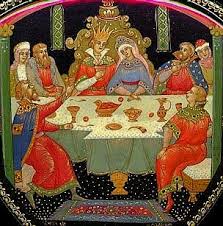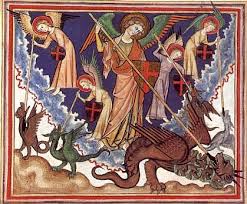In this blog I want to share with you two poems by John Donne (1572-1631) who is regarded as the leading writer of the 'Metaphysical Poets'. They were a group of British lyric poets of the 17th. century who shared an interest in metaphysical concerns and tended to explore them in a similar way. The 'metaphysical' label was, strictly speaking, a misnomer, given to them much later by Samuel Johnson in his 'Life of Cowley'. The thing they have in common is their writing style, which was normally characterized by wit, subtle arguments and the use of unusual simile and metaphor. An example of this is where Andrew Marvell compares the human soul to a 'drop of dew'. John Donne himself, like several other metaphysical poets, was influenced by Neoplatonism, which had its origins with early Christian philosophers such as Justyn and Athenagoras who tried to connect Christianity with Platonism.

John Donne
In his style of writing, John Donne likes to twist and distort images and traditional stanzaic patterns; his speech patterns are colloquial and varied. He sometimes uses traditional verse forms, preferring simple ones, but he is also fond of inventing elaborate and intricate stanzas. In both his worldly and religious poems he often achieves a complex and memorable 'melody'.
One of the main Platonic concepts found in metaphysical poetry and which is evident in the poetry of John Donne is the idea that the perfection of beauty in the beloved is a reflection or remembrance of perfect beauty which exists in the eternal realm.
John Donne was born into a Roman Catholic family at a time when anti-Catholic feeling was at or near its peak, a time when Catholics were subject to constant harassment by the Elizabethan secret police. Although he attended both Oxford and Cambridge universities and Lincolns Inn (the training ground for lawyers), he never took any degrees or practiced law.
Despite his great education and poetic talents he live in poverty for several years, relying heavily on the subsidy of wealthy friends. In 1615 he became an Anglican priest and , in 1621 he was appointed the Dean of St. Paul's Cathedral in London.

St. Paul, Cathedral, London
The Holy Sonnet 17 was written following the death of Donne's wife Ann More at the age of 33, having just borne her twelfth child. This extremely personal sonnet and Sonnet 18 were not discovered until 1892 and survives only in a single manuscript. In Sonnet 17 Donne seems to imply that God took his wife away from him in order to have a monopoly of John Donne's love. The last lines may even suggest that Donne saw his wife as a possible temptation to deadly sin.
Holy Sonnet Number 17
Since she whom I loved hath paid her last debt
To Nature, and to hers, and my good is dead,
And her soul early into heaven ravished,
Wholly on heavenly things my mind is set.
Here the admiring her my mind did whet
To seek thee, God; so streams do show the head;
But though I have found thee, and thou my thirst hast fed,
A holy thirsty dropsy melts me yet.
But why should I beg more love, whenas thou
Dost woo my soul, for hers offering all thine:
And dost not only fear lest I allow
My love to saints and angels, things divine,
But in thy tender jealousy dost doubt
Lest the world, flesh, yea, devil put thee out.
Holy Sonnet no. 18 expresses John Donne's lifelong distress about the fragmentation of the church ('the bride of Christ'). Some have even suggested that he is also showing doubts about the superiority of the Anglican Church, but this remains a matter of debate. In the first four lines the reference to the painted woman probably refers to the church of Rome and the idea of the ravished virgin could refer to the Protestant church. Neither of these seem very much like the ideal bride. The words 'robbed and tore' may allude to a military defeat suffered by German Protestants in 1620. The final lines echo the Song of Solomon (5:2), which was often interpreted as the song of love between Christ and the church: 'Open to me, my sister, my love, my dove, my undefiled.'
Holy Sonnet Number 18
Show me, dear Christ, thy spouse so bright and clear.
What! is it she which on the other shore
Goes richly painted? or which, robbed and tore,
Laments and mourns in Germany and here?
Sleeps she a thousand, then peeps up one year?
Is she self-truth, and errs? now new, now outwore?
Doth she, and did she, and shall she evermore
On one, or seven, or on no hill appear?
Dwells she with us, or like adventuring knights
First travel we to seek, and then make love?
Betray, kind husband, thy spouse to our sights,
And let mine amorous soul court thy mild dove,
Who is most true and pleasing to thee then
When she is embraced and open to most men.


Quotations
'Trying to determine what is going on in the world by reading newspapers is like trying to tell the time by watching the second hand of a clock.'
Hollywood screenwriter Ben Hecht, quoted in the Washington Post
'If work was a good thing, the rich would have it all and not let you do it.'
Elmore Leonard, quoted in Forbes


